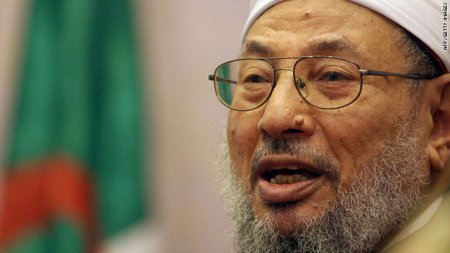Archives
AND MORE...

Shameful Chapter In American History
_____________________

Triple "D" (Squared!)
_____________________

And Away We Go
_____________________

Egypt Burning
_____________________
March 4, 2012
MB Creepin' Along
The Muslim Brotherhood in Libya, considered the most organized movement in Libya (as in Egypt and throughout the Arab world), announced on Saturday that it has formed a political party after six decades in the shadows of Gadhafi's regime (see below).
"Our first main goal is to work on security and stability," said the Brotherhood's spokesman. "We are still a new founded party, but we will work on the basis of Islamic principles and that doesn't mean the shallow meaning of religion most people think of like banning women from leaving home. This is not rational."
Which begs the question, which "rational" Islamic principles do they plan on implementing? The ones that call for killing 'infidel' and 'apostates'?
Yusuf al Qaradawi (pictured below) is their spiritual leader, so gird your loins, folks, as Qaradawi believes that Islam must dominate the world and "will conquer Europe [and] will conquer America."
In light of the rising influence of the Brotherhood and related Islamist groups, which surged following last year's Arab Spring uprisings, looks like they're well on the way to realizing that goal...
Associated Press | March 3, 2012
Muslim Brotherhood Forms Political Party In Libya
By Rami Al-Shaheibi

Yusuf al Qaradawi is regarded as the spiritual leader for the Muslim Brotherhood in
Libya. AFP/Getty Images Courtesy: independentsentinel.com
TRIPOLI, Libya (AP) - The Muslim Brotherhood in Libya announced on Saturday that it has formed a political party after six decades in the shadows of dictator Moammar Gadhafi's regime.
The Islamist group declared the creation of the Justice and Development Party in the absence of laws laying out a formal process for the establishment of political parties.
The Brotherhood's spokesman, Mohamed Gaair, said the group has representation in more than 18 cities across the country, and that more than 1,400 members attended Friday's meeting in Tripoli to declare the formation of the political party.
They chose as party leader Mohamed Sowan, a native of the city of Misrata, which saw some of the worst fighting in the civil war that brought down Gadhafi and has since become distrustful of authority based elsewhere in the country.
Sowan worked as a hotel manager and was a political prisoner under the Gadhafi regime for eight years until 2006.
Gaair said that the Brotherhood has had a presence in Libya since 1949, but that many of its leaders were jailed under Gadhafi or exiled.
Several prominent former rebel leaders fighting to oust Gadhafi were associated with the movement, but the group does not have any officials in the transitional government.
Now, the Brotherhood is considered the most organized movement in Libya to have nationwide support. Supporters include wealthy businessmen who returned to the country after last year's civil war ended, opening up civil society groups and charitable funds throughout the war-ravaged country.
Gaair said the group aims to establish a just and developed society based on religious values.
"Our first main goal is to work on security and stability," he said. "We are still a new founded party, but we will work on the basis of Islamic principles and that doesn't mean the shallow meaning of religion most people think of like banning women from leaving home. This is not rational."
In October, Libya's Western-backed rulers said that Islamic law would be the main source of legislation.
The influence of the Brotherhood and related Islamist groups has surged following last year's Arab Spring uprisings. In Egypt, where the movement was founded in 1928, its affiliated political party has taken around half the seats in parliament.
Elections have swayed heavily in favor of Islamic movements in Tunisia and Morocco, as well. They are key to the opposition in Yemen and are playing a role in Syria's uprising. The Brotherhood's offshoot, Hamas, rules the Gaza Strip. Their political arm in Jordan, the Islamic Action Front, is the country's largest opposition group.
The pan-Arab Muslim Brotherhood, though, is not unified in its interpretation of Islamic law nor in how it should be applied. The groups also have separate funding mechanisms.
The Brotherhood also faces competition from other more hard-line Islamist groups including followers of the ultraconservative Salafi trend of Islam.
Original article here.
Log In »
Notable Quotables
"Mr. Netanyahu is one of the most media-savvy politicians on the planet. On Friday he appeared live via video link on 'Real Time with Bill Maher,' taking the host’s alternately sardonic and serious line of questioning with gazelle-like alacrity."
~ Anthony Grant, jourrnalist who has written for many major newspapers and worked in television at Paris and Tel Aviv, interviewing former PM Benjamin Netanyahu on Monday, at the outset of Mr. Netanyahu's new book (more here).


